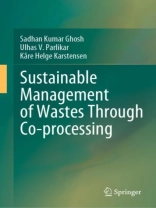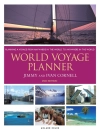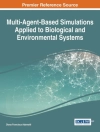This book is the first comprehensive book in the world on co-processing of wastes as Alternative Fuels and Raw materials (AFRs) in cement kilns. It discusses how AFR from wastes can play an important role in contributing toward reducing the use of fossil fuel and costs while conserving natural resources, lowering global CO2 emissions, and reducing the need for landfills. The use of AFR in resource and energy-intensive industries is called co-processing, which is discussed in detail highlighting both advantages and disadvantages. Co-processing in cement kilns is a technology that is practiced globally on a large scale for environmentally sound and ecologically sustaining management of wastes from agricultural, industrial, and municipal sources. Considerable amount of scientific and technological advancements has been put in place while developing and implementing this technology at the cement plant operational scales. This technology is in practice for about 40 years or so and hasbeen recommended by Basel Convention for the sustainable management of hazardous wastes and by the Stockholm Convention for the sustainable management of POPs. This technology has now been included in the waste management rules notified by the Ministry of the Government of India and has been provided as a preferred option for the management of wastes over the conventional options of incineration and landfill. The book addresses how co-processing promotes mitigation of the climate change impacts and also conservation of the natural capital in addition to building a circular economy on a large scale.
Even though this technology has received required attention and inclusion in the policy framework of many governments, its understanding and awareness with the stakeholders belonging to the academic and other relevant sections are vastly missing. The book will enhance the knowledge of co-processing technology among stakeholders involved in the implementation of the policy framework, design and engineering of the waste processing facilities to suit the co-processing operation, their operation and management, environmental consideration in implementing co-processing, operation and management of the cement plant, quality control, etc. In addition, the book will be useful for students and researchers working in this domain.
Inhaltsverzeichnis
Introduction.- Types and composition of wastes.- Waste management rules in India and other countries focussing on co-processing.- Resource recovery options from wastes.- Hazardous waste treatment and disposal.- Evolution of co-processing as a disposal and energy recovery method.- Co-processing technology for waste recycling.- Strategies and policy advocacy.- Facilities for co-processing of wastes.- Facilities for pre-processing of wastes.- Design features involved in equipment and facilities for pre- and co-processing.- Operational considerations in pre- and co-processing of wastes.- Co‐processing in power plant and steel plants.- Co-processing of POPs and DRE.- Mass and heat balance in co-processing.- Emission considerations involved in co-processing.- Development of co-processing technology in India and its status.- Co-processing scenario in other countries.- Business models associated with co-processing.- Sustainable supply chain for co-processing.- Co-processing and considerationson the cement quality.
Über den Autor
Prof. Dr. Sadhan Kumar Ghosh having all degrees up to Ph.D. (Engg.) from Jadavpur University, is Professor in Mechanical Engineering and Chief Coordinator & Founder of, Centre for Sustainable Development and Resource Efficiency Management at Jadavpur University, India. He served as Dean, Faculty of Engineering and Technology at JU, and Director, CBWE, Ministry of Labour and Employment, Government of India, and Larsen & Toubro Ltd. He is a renowned personality in the fields of waste management, circular economy, green manufacturing, supply chain management, sustainable development, co-processing of hazardous and MSW in cement kiln, plastic waste and E-waste management and recycling, management system standards (ISO), and TQM having three patents approved. He is Founder Chairman of the Icon SWM; Founder and President, International Society of Waste Management, Air and Water (ISWMAW); and Chairman, Consortium of Researchers in International Collaboration (CRIC). He receivedseveral awards in India and abroad including the distinguished visiting fellowship by the Royal Academy of Engineering, UK. He wrote 9 books, 52 edited volumes, and more than 230 national and international articles and chapters and is Associate Editor of IJMC&WM. His significant contribution has been able to place the name of Jadavpur University in the world map of research on waste management. He is consultant and international expert of UNCRD/DESA; Asian Productivity Organization; China Productivity Council; SACEP, Sri Lanka; IGES, Japan; SINTEF, Norway, etc. His research funding as PI includes EU Horizon 2020, Erasmus +, UKIERI, DST, DBT, GCRF UK, Royal Academy of Engineering, Georgia Government, Jute Technology Mission, and many other funding agencies. He is involved in policy making bodies in India and standard development in ISO and BIS.
Mr. Ulhas V. Parlikar is Chemical Engineer with B. Tech from Osmania University and M. Tech from IIT Madras. He has also undergone the Senior Management Training Program (2010) and Senior Leadership Training Program (2012) from IMD, Switzerland. He has a total of 36 years of experience in Hindustan Lever Ltd, National Peroxide Ltd, & ACC Limited and has handled different responsibilities such as R&D, Process Engineering, Project Management, Business Development, Technology Collaborations, apart from building a large Geocycle (AFR) Business organization in ACC. He superannuated as Director of geocycle business at ACC Ltd. and Deputy Head of Geocycle India. Currently, he is extending consultancy services globally in the area of waste management, circular economy, policy advocacy, alter^30 papers in national and international journals of repute with scientists, academicians, and officers of CPCB and SPCBs as co-authors. He has also served as Expert Member in drafting the Technology Roadmap Low-Carbon Technology for the Indian Cement Industry that was published by IEA and WBCSD.
Dr. Kåre Helge Karstensen received his Bachelor and Master of Science from the University of Oslo, Faculty of Natural and Mathematical Sciences, Department of Chemistry, and his Doctor of Philosophy from the Norwegian University of Science and Technology (NTNU), Faculty of Natural Sciences and Technology, Department of Chemistry. He is Chief Scientist at the Foundation of Scientific and Industrial Research (SINTEF) in Norway. SINTEF is one of the leading research organizations in Europe with more than 2000 employees from 75 countries. He has been working globally with circular economy, resource optimization, waste management, emission reduction, and co- rocessing for more than thirty years and is regarded to be a pioneer in the use of high-temperature cement kilns for management of hazardous wastes. He has tested and documented the feasibility of using cement kilns for environmentally sound destruction of hazardous organic chemicals like toxic pesticides, various persistent o^400 scientific reports, and >300 oral presentations at international conferences. He founded the company Global Sustainability in 2001 and is currently President and CEO.












